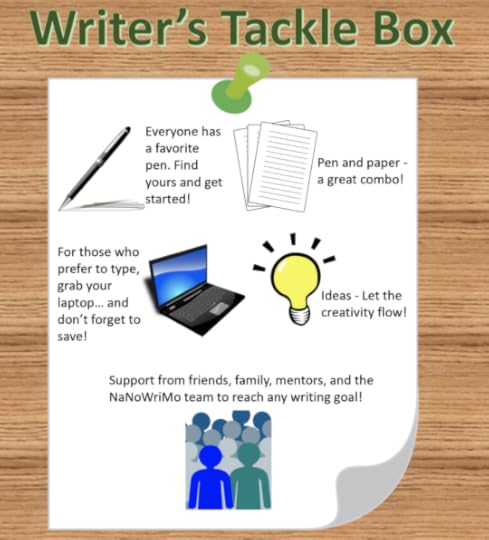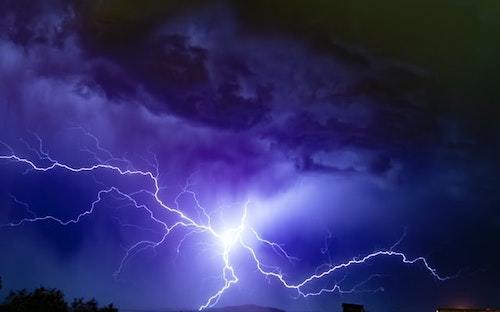Chris Baty's Blog, page 34
September 20, 2021
One-Sentence Exercise for Character Development

You may have the plot, setting, conflict, and now you need one of the most important aspects of any good story: Complex Characters. NaNo guest Chris Cross is here to help with a writing exercise to discover your character motivation.
When it comes to character design, you’ve done your homework. Yeah, baby: You’ve watched the videos—you’ve read the posts—you’ve explored all the threads about making characters authentic, diverse, likable. Now you’ve got characters so solid you could hug ’em.
Next step: How do your characters grow?
Many writers rely on character arcs to map out a character’s inner journey through a story. These types of outlines can be useful for helping you not only understand who your characters are at the beginning, but also justify how they transform by “The End.”
In this post, I’d originally planned to teach you the basics for outlining a traditional character arc … but I don’t want to waste your time. The internet’s chock-full of other posts about character arcs. Besides, we writers outline in different ways. Some of us don’t outline at all (looking at you, pantsers).
Before you set out to map a straight-up Campbell-style character arc, here’s an exercise I’d like you to start with instead. A great thing about this exercise is that you can use it for your protagonist, antagonist, even minor characters with a bigger supporting role.
Ready? Choose a character and fill in this sentence:
To achieve their deepest desire, your Character must gain the thing they’re missing and face their darkest fear—before it’s too late.
Let’s pull this apart:
1. The deepest desire: At the start of your story, what does the character long for? We’re not talking about what they may need, only what they want (or think they want) most.
This desire can be something superficial or vitally important—and by the story’s end, the character may even discover that they don’t really want it after all. But at the start, the deepest desire is what motivates your character to leave their comfort zone and undergo new challenges. Which brings us to …
2. The missing thing: Along with their deepest desire, your character is missing something at the start of the story, something fundamental to themselves. The missing thing can be a flaw, a weakness, a lack of a certain ability, a lie they’ve always believed about themselves or the world, etc. Whatever it is, the character isn’t quite whole without it—and until they find it, they can’t achieve their full potential.
How do they gain the thing they’re missing? They gotta suffer for it. They have to face ever-worsening situations. And that brings us to …
3. Their darkest fear: What obstacle stands in the way of the character gaining what they lack? We’re not talking about fears like spiders or snakes here. The fear of rejection, being left behind, losing a home or loved one, having their greatest secret made public—these examples are relatable to readers because we often confront them in real life.
In your story, you may even have another character—perhaps an antagonist—who embodies this fear for your character. Meaning the character must face that antagonist to overcome the fear itself. And there’s not a moment to lose …
4. The stakes: The final piece—the “before it’s too late” bit—is critical. There doesn’t have to be a literal ticking clock over your character’s head, but without some pressure, there’s no need for your character to act. Without risk, there’s no growth. Whatever they are, the stakes must spur the character on to whatever end lies ahead.
Here’s a handy example: To end the war with the Fire Nation and help the world find balance (deepest desires), Aang must accept his role as the Avatar and master all four elements (missing things) so that he can confront Fire Lord Ozai and the Fire Nation’s subjugation of the whole world (darkest fear)—before Sozin’s Comet gives Ozai all the firepower he needs to destroy the other nations for good (the stakes).
With this exercise, you’ve pinned down the quintessential points needed for your character’s transformation: motivation, conflict, and urgency. However, you decide to outline (or not outline) the rest of your story, keeping this as your foundation will help you make sense of the choices your characters make, see how their struggles influence them and keep them compelling from start to finish.

Chris Cross is a Colorado native who, to the chagrin of friends and family, rambles on about stories (especially children’s/YA books) for hours on end. She took her love of kid lit a little too seriously and earned her Master of Arts in children’s literature from Kansas State University. She is a fun-loving Catholic, a real cookie monster, and an adequate crocheter. Her debut novel, “Brio,” is coming out in November 2021. Geek out with her on her personal, author IG, and her website.
September 17, 2021
Continuing Writing After Camp NaNoWriMo

We know summer camp has been over for a while now. The fun we had at Camp NaNoWriMo is replaced with school deadlines and work. Fortunately, NaNo Guest Erica D reminds us to tap into the nostalgia and have fun writing.
When I think of summer, a wave of nostalgia washes over me. Memories of going to the beach with my family, the feel of the sand in my toes, the smell of funnel cake on the boardwalk, and the thought that this should last forever. But what really stuck with me was the time I spent reading and writing during my summer vacations. My love of books blossomed over those warm months, and over time, my love of writing grew as well.
For me, Camp NaNoWriMo embodies these memories of summer and offers an opportunity to revisit those months I spent writing. Participating in their Camp challenge encouraged better writing habits and persistence in my craft. But now that Camp NaNoWriMo is over, what should we write about? I think it would be a great time to revisit our summer experiences. It could even become a story one day!
Writing prompt: Revisit your time during Camp NaNoWriMo, or your best summer or camp experience, and write about it.
Some tips for getting started:
Visit your Writer’s Tackle Box – It would not be a true writer’s camping experience if you did not open your “Writer’s Tackle Box”. This will have the tools you need to “survive” the wild unknown of where writing can take us!
 Don’t forget to write for FUN! – What is most important is to have fun while writing. Writing does not have to be a chore. It can be a casual expression of yourself. Free-writing can help to clear the mind, provide practice, and get the creativity flowing. During this writing exercise, you can be vague, be descriptive…be whatever you want! Just as long as you enjoy the time spent writing. And remember the fun you had, much like during your summer experience.
Don’t forget to write for FUN! – What is most important is to have fun while writing. Writing does not have to be a chore. It can be a casual expression of yourself. Free-writing can help to clear the mind, provide practice, and get the creativity flowing. During this writing exercise, you can be vague, be descriptive…be whatever you want! Just as long as you enjoy the time spent writing. And remember the fun you had, much like during your summer experience.Erica is a lover of retro fiction, and is developing a blog where she revisits beloved books from the 80s, 90s, and 2000s. She has several writing projects underway, and is currently working on three novels in her favorite genres of fantasy, horror, and fan fiction. As a full-time Molecular Biologist, she aspires to merge her two passions of science and writing into a career in published authorship. When not writing, Erica loves going for runs, enjoying the fall weather, and decorating for Halloween (it’s never too early!).
Top Photo by Scott Goodwill on Unsplash
September 16, 2021
Take the Mystery Out of Writing A Novel: 5 Tips for Reaching Your Goal This November

Every year, we’re lucky to have great sponsors for our nonprofit events. Sisters in Crime, a 2021 NaNo sponsor, was founded in 1986 to promote the ongoing advancement, recognition and professional development of women crime writers. Since that time, their mission has grown and expanded with advocacy for all writers at all stages of their career, learning opportunities through webinars and workshops, and networking. In this post, Sisters in Crime Executive Director Julie Hennrikus shares some tips for taking the mystery out of novel writing:
As we gear up for NaNoWriMo this year, how can you use the November event to reach your writing goals? Here are 5 tips that will help:
1. There’s no one right way to write.You may hear that you “have” to write every day, or write a certain amount of words, or plot, or—the list goes on. Know this. There are many, many ways to write a book. NaNoWriMo is a great kickstart toward 50K words, and it will challenge you in many ways. But the best way for you to write your book is the way that works for you.
2. Never stop learning.When you decide to become a writer, you become a lifelong apprentice at a craft. There is always something to learn. Finding classes, workshops and webinars will help you hone your craft. No matter how long you’ve been writing, there’s still more to learn. (Tip: SinC hosts two webinars a month that are open to all, and we have a library of past events for our members.)
3. Your first draft is going to need work.That’s part of the process! You’ll fix it in the next draft (or ten). The important thing is to get your first draft done so that you can start the editing process. Make notes for yourself in your manuscript with [brackets] so that you can go back and do research, remember a name, add a detail in the next draft, and then keep moving. Remember, embrace progress over perfection. Especially during NaNoWriMo.
4. Enjoy your writing journey.Writing is hard work. If you aren’t enjoying it, figure out how you can make a change that lets you find the joy again. Write in a new location, or try writing longhand for a while. Fall back in love with your characters, or try a new prompt to get your imagination flowing. Find the joy where you can.
5. Find your people.Your writing community makes all the difference. Other writers understand what you’re doing. They’ll push you when you need it, and support you as well. You share a common language with other writers. Many people wait to join an organization like Sisters in Crime until they’ve reached some sort of benchmark—finished a draft, or gotten a contract. Don’t wait. Build your community from the beginning. It will make all the difference.
Last year SinC was a sponsor of NaNoWriMo, holding our own write-ins and sprints to help people get over the finish line. The Write-Ins were so popular we’ve continued them on the first of every month. Our 4500 SinC members range from pre-published to well established writers with one thing in common–we love crime fiction. We’ll be hosting NaNoWriMo events this fall, and everyone is welcome to join us by going here and signing up.
Julie Hennrikus is the Executive Director of Sisters in Crime, and a published mystery author. www.sistersincrime.org
September 15, 2021
Writing Without Writing

Sometimes our writing needs a new grove to it. Though we might not think of it, our hobbies and artistic exploration will help us with our writing goals and this week’s NaNo Prep: Develop a Story Idea. NaNo guest Chris Fordham holds us to a new light that our writing process could be more than writing.
Focusing all of your creative efforts into producing a long form piece of prose is certainly a good approach. Writing challenges such as NaNoWriMo encourage a surge in word processing activity to generate a new story, but is it the only way to write effectively? To constantly hammer the keys, to live and breathe the story in exclusivity?
One of the best lessons I took away from my university course on creative writing, was that being a big reader expands your abilities to weave a story. An avid reader has access to a wealth of examples of descriptive language, world-building, and dialogue beyond their own life experience. Whilst this is all absolutely true, and certainly, something I’d encourage, I wanted to write about another avenue to better writing. When it comes to my writing, I find it important to explore other creative mediums alongside my current long prose project.
Making sketches or art of any quality (not necessarily needing to be a masterpiece), temporarily switches your mind off from the story. The reason this could be a good thing is that whilst the hand is guiding a pen or brush for a while, it is learning something about small details. When you’re making a picture, you are trying to interpret some idea or feeling about the subject. It is much like using words to do the same. If the picture you’re making is related to the story you’re writing, you may even reveal something of a character or scene to yourself that you were as yet unaware of or struggling to resolve. Photography too can be used in such a way. The majority of people will have access to some form of camera, probably used in the main for simple snapshots and selfies. Training your eye as an artistic photographer also gets you thinking about smaller details and how they all add up to a more complete whole.
Music and poetry are perhaps media more easily relatable to using words. Composing a song or working within an unfamiliar poetic form or rhyming scheme forces some interesting wordplay. You can learn something from writing a lyric to a tune, even rewriting the words to an existing song. Cadence is pivotal in music and a component of great poetry; it simply describes the flow or rhythm present in a verse. There is no reason why lines of a story can’t be written within the structures of a poem. Consider a lyrical ballad such as “Annabel Lee” by Edgar Allen Poe, or the songs of Bob Dylan, they are stories but set to a rhythm, stories with a beat to them that moves beneath the sounds themselves. Some of Virginia Woolf’s writings are described as prose poems and exercise this lyricality well. Removing the stanza line breaks doesn’t break the rhythm.
There is a multitude of other hobbies and interests out there that help train your brain to look at things differently. What I’m saying here is that your word count could benefit from you stepping back and remembering your other hobbies. A thousand words can be great or they can be filler depending on their content. Sometimes the exact same subject matter or dialogue can be conveyed in a lot fewer, paced, and placed sounds. Whether the words deeply explore intricate but relevant detail or pack a weighty punch in shorter, more poetic lines, the influence of these other media may play a role in finding them.

Chris Fordham is a jack of all trades, master of none in terms of creativity, mainly focusing his efforts as a musician in a number of projects around Northampton, UK. Chris dabbles in writing poetry and prose. He studied creative writing and philosophy at the University of Northampton. In his spare time he also takes photographs, sketches and paints with watercolour. He’s taken part in the November NaNoWriMo five times, successfully completing it within the challenge deadline on three occasions.
Top Photo by Gabriel Gurrola on Unsplash
September 14, 2021
Meet Our New Programs Intern, Meghana!

We feel super lucky here at NaNo HQ to be able to work with some excellent interns! Today, meet our newest Programs Intern, Meghana Sankar. If you join our Virtual Write-Ins, you’ll be getting to know her better throughout NaNoWriMo, but today she’s here to tell you a little bit about herself:
I spent the majority of my childhood being at a loss for words. I’d moved countries and was suddenly forced into silence. I observed everyone around me, the way they spoke and sounded. I was forced to be a bystander for so long, but I came to fall in love with words. I would spend hours with my nose in books, jotting down phrases too beautiful to forget, and tear-stained notes hidden under my pillow. Words became something I saw as powerful. I wrote to process my own feelings and to make sense of the world around me.
I wrote articles, poems, limericks, and rhymes, but never a story. I have always been bad at finishing things. A thousand stories and characters have found their way into my notebooks and devices. I have dreamt lives for them that have never seen the light of day. When I come up with a story I struggle to find the middle. To give the story more than a skeleton, to give it a heart and soul. Recently I found a story, full-fledged and begging to be brought to life, and that is how I discovered NaNoWriMo again.
NaNoWriMo was a program that helped give my sporadic writing sessions structure. It broke down the seemingly impossible processes of completing a novel. Being able to escape the mundane confines of pursuing a STEM education to an online world where everyone is just as passionate about writing as I am is truly wonderful, and I cannot wait to spend my time this fall as the Programs Intern.
Maybe this is the year I finish a story, or maybe I just begin. Regardless, I can’t wait to join each and every one of you on this journey.
Meghana is the Fall Programs Intern for this year, a Bookstagrammer, and occasional Tik Toker. She’s a psychology major by choice and a poet at heart. She has made many attempts to win NaNoWriMo, but maybe this will finally be the year! An ardent lover of Taylor Swift, second chance romance novels, and Animal Crossing. If you have ever wanted someone to tell you a little too much about yourself just ask her for a tarot reading or tell her what time you were born.
September 13, 2021
6 Tips and Tricks For Writing An Epic Fantasy Novel

We know you’ve been dreaming about starting that fantasy novel. To help with developing a story idea in this week’s NaNo Prep theme, our NaNo guest Zacharia Brendon Devlin shares his guide for creating an epic fantasy novel:
Writing kinda goes with my family. My aunt, Kate Ristau, is a published author of five books (and counting), my sister, Lily, is an amazing author. My grandmother is also an incredible author of two novels, my brother wrote a short story and published it on Blurb, along with his book, Warrior of Nilved. So, long story short, it wasn’t really any surprise when I began writing.
I started writing the first draft of my fantasy novel when I was 8-years-old. Since then, it has gone through several different drafts for several years. Writing fantasy, in my opinion, is one of the most enjoyable genres to write, but it can also be the hardest. Okay, let’s cut down to the chase: writing fantasy can be hard. But with a couple of helpful tips and tricks, the load could be lighter.
1. Gather ideas.
Dream, read, think, talk, etc. Just gather ideas. Some of the greatest stories have gotten their plots from something normal. For instance, S. D. Smith, the author of The Green Ember, got the idea for his bestselling book from when he was taking a walk with his daughter and saw two rabbits hopping in his yard. Chris Grabenstein, the author of Escape From Mr. Lemoncello’s Library (plus numerous other books), got the idea from visiting an amazing library. Like I said before, keep gathering ideas. You won’t regret it.
2. Start with a rough draft.
You may be tempted to edit your story word by word, but it gets done much faster when you start with a rough draft. Don’t try to write in a ton of details or sub-plots until after the first draft is done. Just focus on the main, most important events and facts. You can always add side characters later.
3. Make it IMPOSSIBLE.
Kids (and most adults) love impossible. Fire breathing dragons? Cha-Ching! Flesh-eating, 50 feet tall giants? Bring it! A wizard that can turn people into frogs? Absolutely! You can also create your own creatures or animals. (e.g. In my nearly-finished fantasy novel, The Lost Prince, I created a race of creatures known as the Rinëdslo. J.R.R Tolkien, the author of The Lord of The Rings, created Hobbits. John Flanagan, author of Ranger’s Apprentice series, created Wargals and the Kalkara.) You get the point: the more impossible it is, the more interesting and exciting it is.
4. Create Unforgettable Characters.
All characters in fantasy novels should each have a unique talent. Is your character great at riding dragons or buffaloes? Does your character sneeze when he/she tells a lie? Does your character have a cool or strange weapon? Does your character have a special pet? Just be sure to make it, as always, unforgettable. Also, if you need fantasy names, here’s a .
5. Work Within Your Limits
I know some people who can write for hours on end, and others who can only write for 20 minutes a day. Whatever works for you, do it. Writing when you don’t want to can have a negative effect. 80,000–150,000 words is a typical word count in fantasy novels. You should probably start with a smaller word count, and then slowly add more. I usually like to start with 10,000 and then add a 5,000 every time I win, but you can do a word count that you think is suitable (and doable) for you.
6. Read and Re-read
You can only write as well as you read. Study the classics of the fantasy genre, taking note of what grabs you about each fantasy author’s approach—for example, world-building, character development, or plot twists—and how the storyteller navigates the aspects you find most daunting. You can reread your favorite fantasy books while applying the same lens.
There ya have it! Six tips and tricks from yours truly. I hope they were helpful, or at least worth your time to read them. But I have one more tip for you:
7. Now go; go and write! Take these tips and apply them to your own novels!
Zacharia Brendon Devlin (Zach) is a twelve-year-old fantasy author. He lives in the USA with his nine siblings, lizard, and dog. Other than writing, Zach loves to hike in his backyard forest, play boardgames, talk with his friends, and build LEGOs. His literary inspirations are Brain Jacques, J.R.R. Tolkien, Brandon Mull, and C. S. Lewis.
Top Photo by Maximalfocus on Unsplash
September 10, 2021
Marathoning During the Time of COVID

It’s ok to readjust our goals to become more realistic as things change. Long-time NaNoWriMo participant Nicole Rodovsky writes us a love letter, sharing her experience with writing and offering her vulnerability to remind us to take a rest.
I’m writing you this love letter because I think it’s a message a lot of writers need to hear.
It’s been a ROUGH couple of years for everyone on the planet. We band of merry, delirious, obsessive writers often let loose and give ourselves permission to drink questionable levels of caffeine and eat ridiculous things… all in pursuit of finishing the Race With The Self, for the funniest bragging rights and prizes, and (for many of us) the dream of the ultimate prize: a publishing contract. In these times we have no way of knowing how many of our NaNoWriMo family have fallen from COVID or have gotten ill and recovered, but were unable to finish their goals. Reflecting on this year’s Camp NaNoWriMo July 2021, I have a message for you: Know yourself. Love yourself.
Know when to stop.
I freely made use of lowering my word count goal during this summer’s Camp NaNoWriMo session when I knew I wasn’t up to my original goal. Lockdown has taken a toll on me, and this time I had my smallest goal yet. I’d been struggling all month but I’m normally one of those procrastinationatrixes who somehow manages year after year to pull off my highest word counts in the last few days. But it wasn’t going to happen this time.
I am grateful to report that despite the title of this letter, I don’t have COVID, but I titled it this way because right now it’s most relatable for those who have gotten sick and have had to pause writing for their health.
On Day 17 I pulled off an astonishingly high word count for me, historically. I also grew sick, nauseous, dizzy, my back hurting. There were other unpleasant symptoms, but the dizziness threw me off and I had to Google it to remember I had been through this almost 30 years before: a serious kidney infection.
A couple of days later, the ER gave me a full CT with contrast, two bags of IV fluids, potassium supplements because I had stopped eating, meds for nausea, and an antibiotic infusion by IV. I would have been admitted if I had waited half a day longer.
With just nine days to go, I knew I faced at LEAST six more days of side effects from the antibiotics, plus the symptoms as the kidney infection does battle with the drug. Not to mention sudden caffeine withdrawal! No coffee, no energy drinks. Even my favored black tea is… frowned upon. I needed to eat VERY mindfully, with careful timing: I can’t even grab a yogurt if I’ve just taken my medication. (Seriously, never do it: Think Mentos and Diet Coke out your other end. For hours.) I needed to lower my sugar intake, so all my little guilty pleasures, the tools many of us shamelessly use to keep ourselves alert and awake to write at all hours, had been ripped away until the kidney healed. Even then it could only sparingly be black tea for weeks. And I could not physically sit or lay in one position for hours, writing.
So, I was done for July, whether I liked it or not. I have a new battle to fight, a more urgent one. But I ended early, genuinely satisfied with the copy I’ve written, knowing it was hard-won and a lot of it is great material, ready for when I’m healed and able to revisit these pages.
We fight hard to encourage each other to make it to Day 30. But listen to your body. Love yourself enough to know when you’ve pushed too hard, take pride in the work you’ve accomplished, and come back when you’re healthy and ready to get back at it with gusto.
I will see you, fellow hellions, in November.
Love,
Nicole.
P.S. You’re damn right this letter is going in my word count!

Nicole Rodovsky / EveningScribe on the NaNoWriMo site, is a 46 year-old unpublished writer and bead artist originally from Seattle, Washington. Her main genres are usually Science Fiction or Fantasy, but she is currently working on her first Historical Fiction Horror novel, which she hopes to find a publisher for upon completion. She is a member of the vibrant writing community in Second Life and has participated in NaNoWriMo since 2003. She has won a number of times and currently lives in Pullman, Washington.
Top Photo by Steven Lelham on Unsplash
September 9, 2021
You Can Now Announce Your 2021 NaNoWriMo Project!

Are you excited to explore, discover, and create new stories this November? How about joining the biggest community of writers in the world as we embark on a fun and challenging adventure? If you’ve been waiting for the universe to give you a sign that you should write that novel you’ve been dreaming about, then consider this your invitation!
Announce your 2021 NaNoWriMo Project!You can now officially announce your project for National Novel Writing Month 2021! You can choose the genre you’ll be writing, share an outline or summary, and even connect a Pinterest board or music playlist to your project to get in the brainstorming mood.
Explore what NaNoWriMo has to offer:Join a region to find virtual events run by your local volunteer. Find your region here, then join it to get updates from your local Municipal Liaison! (All official 2021 NaNoWriMo events will be held virtually. View more information on this decision.)Say hello in the forums, and find support and resources. If you’re just getting started, check out the Newbies forum to say hello, the Coffeehouse to check out the conversation, and the Reference Desk forums for any research help for your writing project.
Download some digital flair. Let the world know you’re writing by downloading our social media badges and banners! Designed by the wonderful Andrea Floren.
Get ready to write with NaNo Prep 101. Our NaNo Prep workbook will help you get ready to reach 50K in November with a 6-week course of guided exercises. Starting September 14, we’ll have themed weekly resources, events, and discussions to help you dive into your story. Or, you can visit the NaNo Prep page and do the exercises at your own pace!
Find exclusive deals for NaNoWriMo participants. Every year, we partner with some incredibly generous sponsors. Check out our offers page to find deals on writing software, publishing resources, writing communities, and more!
Write for the NaNoWriMo blog. Interested? Just fill out this form, and we’ll get in touch if we think you’re a good fit! (Please note that we receive a high volume of interest in writing for the blog, and may not be able to respond to everyone. This is currently an unpaid opportunity.)
August 11, 2021
The Flash Fiction Approach to Writer’s Block

There are about a thousand tricks to help push yourself to write, so what about using flash fiction? Nano guest Michael Mortenson shares how flash fiction has helped him and his work.
Halfway through draft two of my novel manuscript, I hit a wall. You know the one—thick bricks that scrape up hands, barbed wire across the top, and no holds for your trusty grappling hook. That’s where I was when I discovered flash fiction.
I had been warned by other writers that dipping toes into the pool of sparkly, new ideas halfway through a project was a decidedly bad idea. But between me and the wall, progress wasn’t happening. So, I thumbed my nose at warning and told myself that writing something was better than writing nothing. I started writing flash fiction.
Flash fiction is any fiction under 1000 words. It aims to deliver the same results as long-form fiction (character, setting, conflict, emotional payoff, etc.), but in a compact space. Since I was writing sci-fi, I figured that I would write flash sci-fi and let some of the sparkly, new ideas breathe so they would stop crowding out my novel. However, a sense of foreboding lingered about the thought of letting new ideas run wild, so I set myself a limit. I would borrow from poetry and limit my stories to 17 syllables, haiku-style.
Cautiously, I began writing sci-fi haiku flash fiction pieces, and the benefits surprised me. First, I was writing again. After being stuck at the wall for so long I had forgotten what writing was like. Seventeen-syllable step by seventeen-syllable step I started gaining momentum. Confidence in my writing ability I didn’t realize I’d lost came trickling back in.
Flash fiction forced me to economize. I learned quickly which words were doing the heavy lifting and which words weren’t. Flash fiction forced me to focus on the best detail, the strongest character attribute, the deepest emotion, and the best source of conflict. Cut the rest. There wasn’t room for anything else. If I wanted a certain voice, I had to establish it immediately. If I wanted a specific tone, each word had to reinforce it. I discovered weaknesses in my writing I hadn’t realized were there. And I actually enjoyed it!
The compact space also means that I cycled through edits quickly. I learned my process for editing and polishing, taking a piece from start to finish. This, I think was the key skill that I needed to learn to move forward with my novel’s second draft.
Slowly, I poured what confidence and writing skill I could into working on the second draft of my novel again and the wall started to give way. When the wall grew stubborn, I would return and write a couple sci-fi haiku until I was warmed up, and then I would tackle the wall. Sure enough, flash fiction time and time again provided the extra boost I needed to move forward.
If you are stuck at a wall or have been toying with the idea of writing flash fiction, give it a go! Here are some tips to get started:
Give yourself a word limit. Limitations force you out of the comfort zone and into the creativity zone.Choose one or two characters. You don’t have room for more, but that’s okay. These will be strong characters.Choose one setting. Home in on the key details (especially details that interact with the senses.)Choose one conflict. Plots in flash fiction are often simple, perfect for outliners or discovery writers alike. Maybe you’ll try a twist ending?Write fast and edit slow. Once you’ve got the first draft, take time to visit each sentence and each word. Ask yourself what could go, what could be better, and what needs to stay.Smile, ‘cause you just wrote some awesome flash fiction! Flash fiction is especially fun because it is easy to share on social media or with friends.As an example, here is a recent sci-fi haiku from a series of small-town Americana themed pieces:
Unabductable
Oh, they tried beaming
Ol’ Bessie up, but that heifer’s
solid as bricks.
Flash fiction not only helped me solve my problems with draft two, but it also gave me a chance to discover and grow along the way. The next time you come to a wall, remember that the way over might be to let the friendly flash fiction space aliens beam you across to the other side. Above all, writing is an adventure, so hold on tight. We’re in for a wild ride.

Michael Mortenson is a science fiction writer from Las Vegas. His work has been featured in various publications including Scribendi, The Palouse Review, and Leading Edge. He has published two books for children: Gibraltar and Tell Me When I’m Younger. If you would like to read more, visit online or visit h is sci-fi haiku work is available on Instagram.
Top Photo by Vlad Panov on Unsplash
August 9, 2021
How to Get Out of A Writing Slump

Feeling a writing slump approaching you and your story? Get ready for some tips by guest writer Aamna to help get you focused and ready to continue your writing goals.
So writing slumps. Wow! Isn’t that a big can of worms? This little curse can descend upon a writer, no matter a beginner or published when they least expect it. And for several reasons. The most common instance can be when you are right in the middle of a story or a first draft. So here are some methods that I have come across in my writing journey, and have seen work really well for either myself or others.
1) Take a break from your current project. Let your subconscious do the processing.Sometimes you’re just not feeling your current project. How do get your heart back into it again? Drop it and do something else. What I would recommend doing in this situation is, write a short story. Or a poem. Or fanfic. It doesn’t have to be related to your WIP. It will get your conscious mind out of a rut, but it’ll still be processing in the back of your brain, and later when you come to your novel, Voila! You have a fresh set of eyes and renewed vigor for your story.
2) There’s a reason NaNoWriMo has pep talks.By far, the thing that has worked for me the most is listening to other writers speak. Even if it is just a writing buddy and not a published author, there is something truly magical about listening to a storyteller gush about their story with the passion of a hero ready to save the world. The incessant urge to create something just as beautiful or being on that high of imagination that washes over me as I listen to them has worked for me several times when I feel myself falling into a slump.
Go through the NaNoWriMo pep talks, listen to author interviews or podcasts, or find a writing buddy. Remind yourself how fun it is to write.
3) Go back to the synopsis of your story to see what made you excited to write that in the first place. Rejuvenate the love!I have personally seen that doing this little can trick can give you that dose of motivation you need to get back into a story. It takes you back to that place when you loved that idea and gets you excited to work on it again.
My ideas come to me in the form of something like a Goodreads synopsis, so whenever I want to get back to working on it again after a break (maybe because of upcoming exams or tests), I have seen that going through the “hook”, helps to re-ignite that love and excitement about the idea.
4) Make a mood board or playlist for your characters or setting.A writing slump may not necessarily be a complete turn-off from working on a story. It can also be that you are just in a position that you are not able to get the words out, but that doesn’t mean the only way to effectively work is ‘words.’
Creating aesthetics and playlists can be a very fun, entertaining exercise to do, and make the writing process seem less like a chore.
5) Allow yourself the break. Don’t push yourself back into writing full-length novels or projects.Every time you take a break from writing does not have to be called a writing slump. Sometimes it’s way better to take a mental health break, or just put a pause for no other reason that you don’t want to, and you’d rather work on something else.
You should know when to shelve a story or let a project go. It’s completely okay to stop in the middle of a WIP and delve into a new idea instead of forcing yourself to brainstorm and drag yourself through a story that you are not interested in anymore. A lot of the time that’s exactly what pushes you into a slump in the first place.
6) Remove the pressure. Don’t let perfectionism hold you back.Editing as you write is not the most advisable course of action, especially when you’re a new writer. And fretting about things like sentence structure, word choice, or minute grammar errors shouldn’t be the focus while you’re writing. The first draft of anything is a mess. This is when you should turn off your inner editor, and let your perfectionist inner-self take a back seat. Little things like these, even though you may not realize it, do a lot to demotivate you and take the away joy of writing because you feel that nothing you write is ever good enough. Don’t compare yourself to published authors. Their books have gone through developmental edits, copy edits, beta readers, and whatnot.
Constantly expecting and beating yourself up for not being as good as someone else can push you into a slump faster than a boring story.
Aamna (she/her) is a young devourer of books, stories, and any other form of words you can give her. More often than not, you can find her either reading, daydreaming about her seemingly never-ending WIP, or working on her blog. She likes to say that words are her superpower, and has a weird obsession with Marvel, ice cream, really bad art journaling, and Scrabble. She lives in India and is currently working on a Turkish-inspired fantasy novel. You can also follow her on IG.
Top Photo by Ryan Snaadt on Unsplash
Chris Baty's Blog
- Chris Baty's profile
- 63 followers



